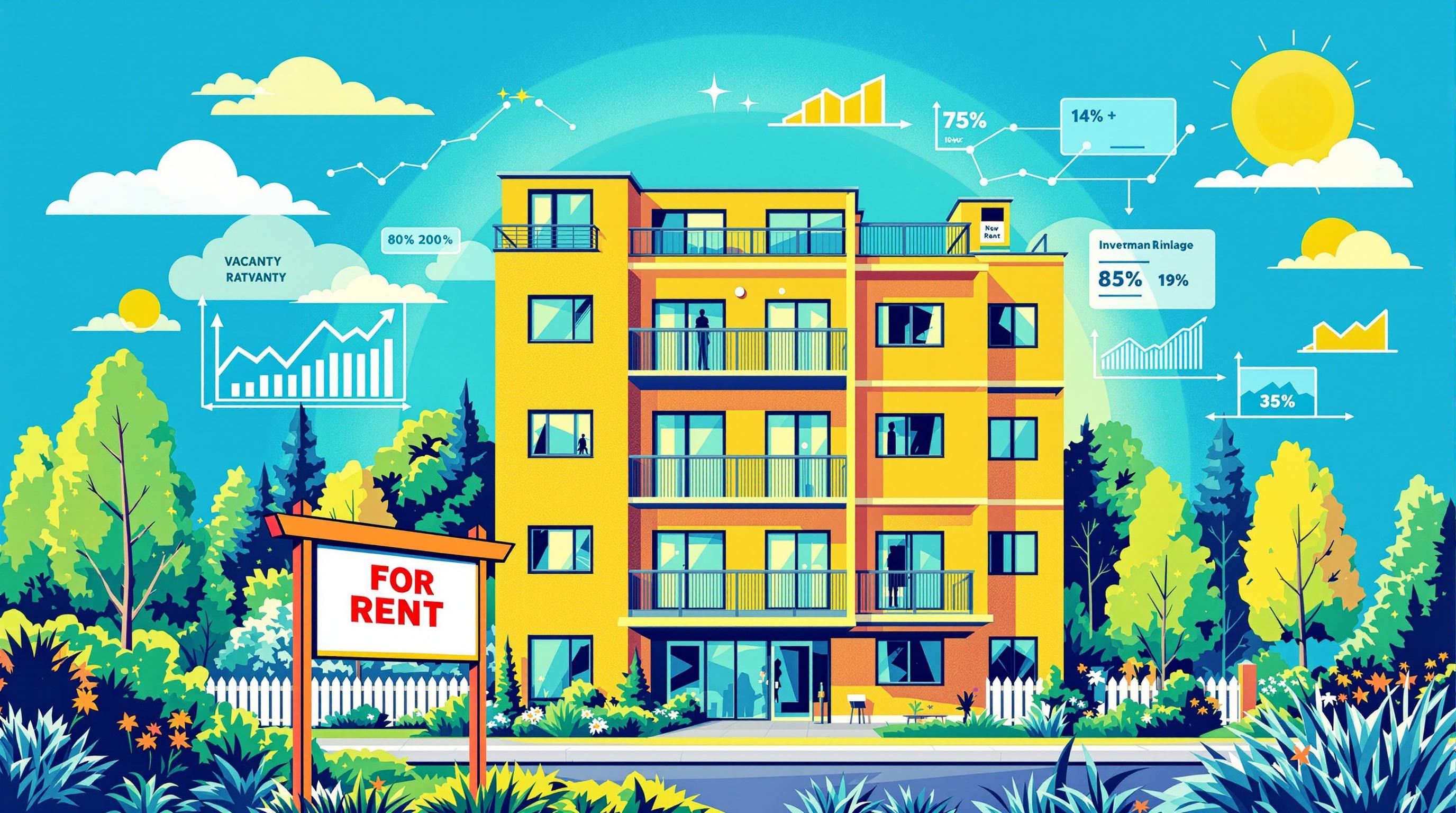Managing rent increases can be tricky, especially with strict rules like Nova Scotia's 5% cap for standard rentals (5.8% for mobile homes). Here's what you need to know to stay compliant and avoid legal or financial issues:
- Follow the Rent Cap Rules: Increases above 5% (or 5.8% for mobile homes) are illegal and can result in fines up to $10,000.
- Provide Proper Notice: Written notice is required - 4 months for most leases and 7 months for mobile homes. Missing the notice period invalidates the increase.
- Understand Lease Terms: Rent increases can only occur at lease renewal or with proper notice for month-to-month agreements.
- Keep Accurate Records: Document all agreements, notices, payments, and communications to avoid disputes.
- Do a Market Analysis: Set competitive rents to avoid pricing too high (leading to vacancies) or too low (hurting profits).
- Seek Professional Help: Property management services can simplify compliance, tenant communication, and pricing.
Quick Example: For a $1,600 rental, the maximum increase allowed under the cap is $80. To implement this by July 1, 2025, notice must be given by March 1, 2025.
Staying compliant with these rules not only avoids penalties but also improves tenant retention and ensures a steady income. Dive deeper into each point to manage rent increases effectively.
Why big Halifax landlords are reporting average rent increases above N.S. cap
1. Not Following Rent Cap Rules
In Nova Scotia, landlords must adhere to the 5% annual rent cap, which is in place until December 31, 2027 [2]. For instance, if a tenant's monthly rent is $2,000, any increase above $100 would break this rule.
Penalties for exceeding the cap are steep. Violators could face fines ranging from $500 to $10,000 under the Emergency Management Act [4] and up to $1,000 under the Residential Tenancies Act [5]. These penalties highlight the importance of staying within the legal limits, but enforcing these rules can be a challenge.
Compliance isn't always straightforward. Mark Culligan, a community legal worker at Dalhousie Legal Aid Service in Halifax, sheds light on the issue:
"Tenants are in greater need of protection from the state as their bargaining power in the marketplace erodes" [4].
To simplify compliance, companies like Kirin Property Management use technology to help landlords track rent increases. Their tools provide real-time updates, ensuring landlords stay within legal limits while also improving tenant satisfaction.
2. Missing Notice Period Requirements
Landlords sometimes fail to provide the proper written notice for rent increases, which can lead to invalid increases. In Nova Scotia, the required notice period depends on the lease type, and failing to meet these timelines means the increase cannot legally take effect. Following these notice rules is just as important as adhering to rent cap regulations.
Notice Periods by Lease Type
| Lease Type | Required Notice Period |
|---|---|
| Annual Lease | 4 months |
| Monthly Lease | 4 months |
| Weekly Lease | 8 weeks |
| Mobile Home | 7 months before lease anniversary |
The written notice must include both the new rent amount and the date it will take effect. Without proper notice, tenants are only required to pay their current rent on the usual due date. For instance, if a landlord gives just two months' notice for an annual lease instead of the required four months, the rent increase won't apply until the correct notice period has passed.
Special Rules for Mobile Homes
Mobile home rentals have stricter requirements. Landlords must use Form M and give at least seven months' notice before the lease anniversary date. In 2025, mobile home properties may see a higher allowable rent increase - up to 5.8% - to reflect different operating costs [1].
Staying Compliant
To avoid mistakes, many landlords turn to professional property management services. For example, Kirin Property Management uses technology to track notice deadlines and ensure all documentation is handled correctly.
Here’s a practical example: If rent is due on July 1, 2025, for a standard annual lease, the landlord must send written notice by March 1, 2025, to meet the four-month requirement [1].
Lastly, remember that removing services included in the lease - like utilities, parking, or other amenities - is treated as a rent increase. This means it also requires the same notice period.
3. Mishandling Lease Terms
Managing lease terms properly is key to staying compliant with Nova Scotia's rent regulations. One common mistake is trying to change active lease terms, especially when it comes to rent increases. To avoid issues, start planning for lease renewals well in advance - ideally 6 to 8 months before the lease ends. This helps avoid last-minute decisions and reduces the risk of vacancies.
Timing Guidelines
- Fixed-Term Leases: Start renewal discussions 6–8 months before the lease ends. Any rent increase can only take effect at renewal.
- Month-to-Month Leases: Provide at least 30 days' notice for any changes.
- Annual Leases: Begin discussions 4–6 months before the lease expires.
Offering Flexible Lease Options
Providing options like 6-, 12-, or 18-month lease terms can help meet tenant needs and improve retention. Flexibility is often a key factor in keeping tenants satisfied.
Document Everything
If you're increasing rent during a lease renewal, make sure all changes are clearly documented. The updated lease should include the new terms, effective dates, and signatures from all parties involved. For landlords using services like Kirin Property Management, automated systems can simplify tracking and ensure everything is compliant.
Stay Competitive with Market Rates
Reviewing market conditions is essential to set renewal rates that are fair and competitive. Rates that are too low can hurt profitability, while steep increases might drive tenants away. Keeping detailed records of market rates, lease dates, and renewal deadlines helps ensure rent increases are both timely and compliant. Proper documentation also lays the groundwork for accurate record-keeping later on.
sbb-itb-00c8bef
4. Poor Record Keeping
Keeping accurate records is just as important as managing lease terms and providing proper notice. Without clear documentation, landlords may face legal challenges and disputes with tenants. Good record keeping forms the backbone of rent increase compliance.
Key Documents You Should Keep
Make sure to hold onto all relevant records for 5–7 years after each rental agreement [6]. Here’s what you need to keep:
- Rental Agreements and Lease Terms: Signed copies of all leases.
- Payment History: Details of rent payments, including dates, amounts, and methods.
- Rent Increase Notices: Copies of any formal notifications sent to tenants.
- Property Maintenance Records: Logs of repairs, inspections, and related expenses.
- Tenant Communications: Any correspondence about rent changes or lease terms.
Choosing Between Digital and Physical Records
Organizing records effectively is critical for property management. Here’s a quick comparison of digital versus physical systems:
| Feature | Digital System | Physical System |
|---|---|---|
| Accessibility | Instant access anywhere | Limited to office |
| Backup Options | Cloud backup | Manual copying |
| Search Capability | Quick search | Manual review |
| Storage Space | Minimal | Requires physical space |
| Cost | Subscription-based | One-time purchase |
Both systems have their pros and cons, but digital options often save time and space, making them a popular choice.
Tips for Staying Organized
- Centralized Filing: Keep all property-related documents in one organized location for easy access.
- Regular Backups: Protect your data by creating backups - automated solutions work best for digital files.
- Consistent Naming: Use a standard format for file names, like
123MainSt_Unit4_Lease_20250304, to make retrieval easier.
Legal Documentation Requirements
Landlords are legally required to provide certain documents, such as:
- Written security deposit receipts within 10 days [8].
- Detailed rent payment receipts, including the date, amount, and property details [8].
- Records of maintenance requests and responses [7].
Using tools like Kirin Property Management can simplify the process by automating records and ensuring compliance. Organized, transparent documentation not only helps with rent increases but also protects you from potential disputes.
5. Missing Steps for Above-Cap Increases
Handling above-cap rent increases comes with strict legal requirements. Skipping any step could lead to invalidation or penalties. If you're managing properties where standard increases don't apply, here are the additional steps you need to know.
Understanding Above-Cap Eligibility
In Nova Scotia, landlords of mobile home properties can request rent increases above the annual guideline, but only with specific approval [1]. This requires submitting a formal application along with a $31.15 filing fee [1].
Required Notice Periods
The notice period depends on how much the rent is being increased:
| Increase Amount | Required Notice |
|---|---|
| 10% or less | 30 days written notice |
| Above 10% | 90 days written notice |
If the proper notice isn't given, the increase cannot legally go into effect [10].
Documentation Requirements
When applying for an above-cap increase, ensure you have the following:
- Current rent amount
- Proposed new rent amount
- Effective date of the increase
- A clear justification for the request
- Detailed rent calculations
- Supporting documentation for the legal formula used [11]
Jurisdictional Compliance
Check with your local city hall to confirm compliance with rent control laws and any specific local ordinances that might apply [10].
Professional Guidance
Navigating these rules can be tricky. Consider consulting experts like Kirin Property Management or a legal professional to ensure you're following all the necessary procedures.
It's worth noting that the province is not currently planning any changes to the rent cap legislation [9]. Staying informed and following the existing rules is essential.
6. Skipping Market Analysis
In 2024, while 85% of landlords increased rents [13], many neglected proper market analysis, leading to potential pricing mistakes. Without this step, landlords risk financial loss by either undervaluing their properties or overpricing them, which can result in prolonged vacancies.
Ignoring market research can cause several issues: setting rents too low, pricing too high and struggling to find tenants, missing seasonal trends, or overlooking local market dynamics.
For example, in Q3 2024, the national rental vacancy rate was 6.9%, and the median rent for a two-bedroom apartment climbed to $1,906 - a 3.2% increase compared to the previous year [13].
Key Market Factors to Consider
To set rents accurately, landlords need to account for these factors:
| Factor | Impact on Rental Pricing |
|---|---|
| Seasonal Demand | Higher demand during spring and summer often supports rent increases. |
| Local Economic Conditions | Job availability and income levels directly affect tenant interest. |
| Neighborhood Development | New amenities or infrastructure can justify higher rents. |
| Vacancy Rates | Lower vacancy rates provide room for more aggressive rent adjustments. |
Using Market Data Effectively
There are clear advantages to leveraging market data. For instance, a Halifax condo owner used data-driven pricing tools and increased monthly rent by $200 while maintaining full occupancy [12]. This shows how informed decisions can lead to better financial outcomes.
Tools for Market Analysis
Landlords have access to a variety of resources for market analysis, including platforms like Zillow and Rent.com, local government data, market reports, and AI-driven tools for comparative market analysis (CMA). Professional property management services also offer expertise in this area.
For those looking for a tech-forward solution, services like Kirin Property Management (https://kiringrp.com) provide AI-powered CMA tools and tailored insights to help landlords optimize rental pricing.
A helpful guideline is the 2% rule - aiming for monthly rent to equal at least 2% of the property’s purchase price [12]. Combining this rule with detailed market analysis can guide landlords toward smarter pricing decisions.
7. Managing Without Professional Help
Handling rent increases on your own can lead to costly mistakes, from legal issues to incorrect pricing. Without proper analysis, you might set rents too high, leading to prolonged vacancies, or too low, cutting into your profits.
Services like Kirin Property Management use AI-powered tools to provide accurate rent recommendations based on real data. These tools offer a smarter way to make rent decisions, as highlighted by the benefits of professional management discussed below.
"After switching from my old manager, I realized how much time and money I'd been losing. Kirin's data-driven approach got me another $150/month in rent, and their maintenance crew is fast and fair-priced." - Michael T., Dartmouth Landlord [3]
Professional management, typically charging around 9% of rental income, includes services like AI-driven rent analysis, compliance checks, tenant communication, and market tracking.
Beyond simplifying operations, professional management can also improve tenant retention. According to industry stats, 72% of tenants value prompt communication from their landlords [15]. Many management companies now offer online platforms and mobile apps, making it easier to resolve issues quickly and keep tenants satisfied.
"I was skeptical about their 'AI rent analysis,' but it genuinely worked. Our vacancy went from five weeks down to one. That's thousands saved right there. And the monthly reports are super clear." - Angela R., Clayton Park Home Owner [3]
Market Trend Monitoring
Professional property managers keep an eye on key market trends, like the Annual Allowable Rent Increase Amount (AARIA). In Nova Scotia, for example, the AARIA is set at 5.8% for 2024–2025 and is expected to drop to 3.2% in 2026 [14]. This knowledge helps ensure rent adjustments stay competitive and compliant.
Conclusion
Managing rent increases in Nova Scotia requires juggling strict regulations - like the 5% cap for standard rentals (5.8% for mobile homes) and specific notice rules - with careful planning. Even adjustments, such as removing included services, are considered rent increases under the law [1][2]. These details highlight the importance of planning ahead for landlords.
"When they told me 9% instead of the usual 12, I figured there had to be a catch. Nope. They're transparent about every fee, and their service has been top-notch. Best investment move I've made." – Jason B., Multi-Property Owner [3]
Professional property management services can simplify this process. By leveraging technology, these services help landlords improve rental income while staying compliant. In many cases, the benefits - like better rates and fewer vacancies - offset the management fees [16].



